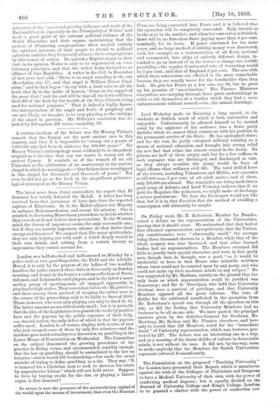On Friday week, Mr. E. Robertson, Member for Dundee, raised
a debate on the representation of the Universities, moving that it should cease. He maintained that they had at first obtained representation surreptitiously, that the Univer- sity constituencies were "abnormally small," the average being three thousand electors to a Member, while that of the whole country was nine thousand, and that other learned bodies had no representatives. The Members returned did little to justify their special character, and were, in fact, party men, though that, he thought, was a good, "as it would be intolerable to have in that House nine scientific wobblers whose votes could not be counted upon by any party, and who could not make up their academic minds on any subject." He was supported by Mr. Haldane, mainly on the ground that the only basis on which representation could be justified was democracy; and Sir G. Trevelyan, who held that University elections were a survival of privilege, and that University Members opposed all the great reforms. The tone of dislike for the cultivated manifested in the quotation from Mr. Robertson's speech ran through all the speeches on this side, as did the feeling that University Members had no business to be all on one side. We have quoted the principal answers given by the Solicitor-General for Scotland, Mr. Mowbray, Mr. Raikes, and Mr. Plunket elsewhere, and have only to record that 126 Members voted for the "immediate death" of University representation, which was, however, pro- tected by 217. The debate was an interesting one in a way, and as a warning of the latent dislike of culture in democratic minds, is not without its uses. It did not, by-the-way, seem to strike anybody that the Members for Scotch Universities represent cultured Nonconformity.


































 Previous page
Previous page